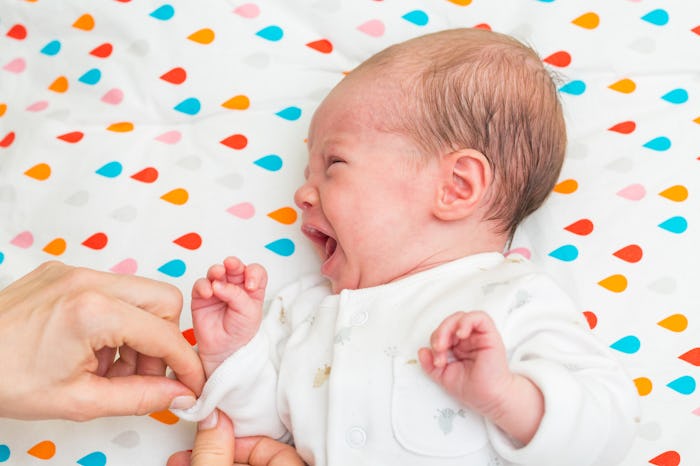Life

Can Babies Tell If A Person Is Bad?
Though most people assume babies are only good for sleeping, cuddling, crying, eating, and pooping, you might be surprised to hear that babies have a lot going on in that little head of theirs. Aside from recognizing faces, responding to music, and talking with their hands, your baby might just be able to distinguish a person's demeanor. I know what you're thinking, can babies really tell if a person is bad? Although the idea might seem a bit outlandish at first, recent research found that babies can distinguish whether a person is good, bad, or somewhere in between.
According to The Guardian, babies as young as six months can distinguish between good and bad people. The news outlet reported on a study done by Yale University, which stated that this ability provided a great evolutionary advantage in the long run. The experiment was performed with a series of characters who either attempted to push a block up a hill, or prevented it from happening. And according to Karen Wynn, lead researcher on the study, the study showed that babies have a preference for helpful individuals, and that babies are able to pick up on micro-cues that researchers still have yet to discover. Babies are "an unbiased third party and they are not at all shy about rendering a judgement on social actions,” according to Wynn, which made them perfect subjects for distinguishing between good and bad characters.
In another study at Yale University's Infant Cognition Center, babies were presented with a puppet trying to open a box. A good puppet helped to open the box, while a bad puppet slammed the box shut. In the study, more than 80 percent of the infants chose the good puppet, supporting the idea that infants really can tell the difference between good and bad. "Humans are born with a hard-wired morality, a sense of good and evil is bred in the bone," Paul Bloom, author of Just Babies: The Origins of Good and Evil, told CNN. And the studies seem to back Bloom up.
As your children grow up, they continue to form their opinions and instincts about good and bad people, not just through studies with puppets and blocks, but through facial expressions and character traits. According to a Harvard study published in Psychological Science, a journal of the Association for Psychological Science, children as young as 3 years old tend to judge peoples character traits just from looking at their faces. Trustworthiness was the trait that children seemed to be able to single out among the rest, from a single glance. This innate ability that children have to judge the goodness of a person starts so young that it seems nearly impossible, but the research shows that babies really do know what they're sensing.
So the next time your baby gets squirmy, unhappy, or otherwise, around a new person, don't just brush it off as a crank baby. Take their reaction into consideration, and choose your companions wisely.